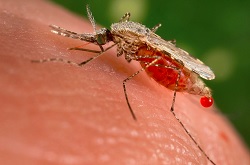 |
GlaxoSmithKline's ($GSK) malaria candidate is the furthest along in the quest for a vaccine, but it's not perfect.
In a Phase III trial involving 15,000 children in Africa, early results showed that children who received three doses of the vaccine were half as likely to contract malaria infection in the year after vaccination. But results reported Friday in The Lancet showed a significant decline in the level of protection after four years.
In children who received a booster fourth dose of the vaccine, the number of clinical episodes of malaria at four years was reduced by just 36%. And without a booster dose, "significant efficacy against severe malaria was not shown," The Lancet said.
Still, given the estimated 198 million malaria cases in 2013, that efficacy level could still translate into millions of prevented malaria cases in children, Brian Greenwood, corresponding author and professor of clinical tropical medicine at the London School of Hygiene & Tropical Medicine, said in a statement.
"Despite the falling efficacy over time, there is still a clear benefit from RTS,S/AS01," he said.
For that reason, GSK last July submitted the prospect to the EMA for regulatory review. If the EMA grants a positive opinion, a policy recommendation could follow by the end of this year, WHO has indicated.
Malaria is notoriously difficult to produce a vaccine against because it is caused by a parasite. GSK's malaria vaccine is the most advanced, but PATH's Malaria Vaccine Initiative scored $156 million from the Gates Foundation in November to develop two types of malaria vaccines. Glaxo's candidate, RTS,S is an anti-infection vaccine, which is one of the types the MVI is working on. The other type is a transmission-blocking vaccine, which stops infected people from transmitting the malaria parasite to mosquitoes.
- here's the release
- read the study abstract
Special Report: The top 5 vaccine makers by 2013 revenue - GlaxoSmithKline